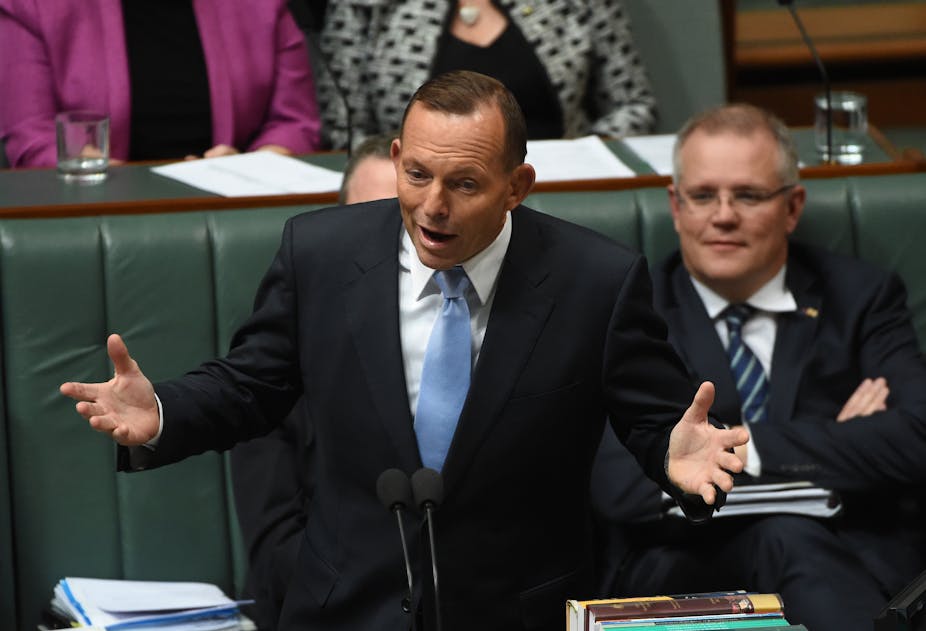Quizzed about last week’s sensational cabinet leak, Prime Minister Tony Abbott says people around Parliament House want to focus on “process” but the public want the government to focus on “outcomes”.
“The public don’t really care about who said what to whom in any particular meeting,” Abbott told reporters on Monday, as the leak story continued to dog him. “What they want to know is that this is a government which has got a clear and strong plan to protect them.”
If Abbott himself believes that process doesn’t matter too much, this is not just a recipe for bad policymaking. It means he has learnt little from being in the cabinet room for years in the Howard government, from the cautionary tale of Kevin Rudd and from the complaints of ministerial colleagues which contributed to his February leadership crisis.
Process is important and any prime minister ignores it at his or her peril.
Abbott threw it aside last week – and he’s been singed as a result.
The plans to strip citizenship from those engaged in terrorist activity were brought to cabinet without a formal submission, and with an accompanying discussion paper having been seen by only Immigration Minister Peter Dutton, Abbott and Attorney-General George Brandis.
The proposals included removing Australian citizenship from dual citizens (for which legislation will be introduced this month), and a more radical option to extend this to Australian-only citizens considered eligible for citizenship elsewhere.
The latter proposal, now out for community consultation before a decision, produced the sharp split among ministers, with critics vociferous and worried about the danger of leaving people stateless. Some were also angry about Abbott’s cavalier attitude to cabinet.
No doubt there would have been an argument about the second proposal however things had been handled. But if Abbott had followed an orderly cabinet process, having the immigration minister circulate a submission for comments from the various departments and giving adequate time for ministers to scrutinise it before the meeting, it’s likely he could have avoided the spectacular leak that has exposed deep fissures in the ranks.
That the issue involved security and had gone to cabinet’s national security committee is no excuse for treating cabinet disdainfully.
The fractures have now gone beyond the division in cabinet, with a letter to Abbott signed by more than 40 backbenchers urging that the radical option be embraced. This has been interpreted as a slap at the dissident ministers.
One of the backbench organisers of the letter, Luke Simpkins, told Guardian Australia there was no need to wait for a discussion paper on the additional option. He was disappointed at the two-stage process but heartened to learn via text that Abbott believed “the concept is still the right way to go forward”.
An opposing but obviously minority view has been articulated publicly from an unlikely quarter. Conservative senator Cory Bernardi regards the idea of going beyond dual citizens as a dangerous “power creep”.
The backbench letter sounds good for Abbott but could carry its own risks.
It has been seen as reinforcing Abbott’s leadership, and indicating that aspirants Julie Bishop and Malcolm Turnbull, who were among the half-dozen cabinet critics, are on the outer with the backbench.
Abbott wants to pursue the radical option, but what if it proved too difficult and he couldn’t deliver to the enthusiasts?
Britain is the model but it inserted a “reservation” when it signed up to the international treaty prohibiting leaving a person stateless. It can do that without breaching its obligations. Australia put in no such reservation, which might make the radical option more tricky here.
There is also the question of how the consultations will go. Abbott is probably right that the community wants tough action – but what sort of wrinkles the discussions might throw up is yet to be seen.
If, having galvanised the backbench, Abbott had to say it was all too hard, that would be an awkward message to deliver to the gung-ho troops. There would certainly be some mutters of “we told you so” from the dissident ministers.
Former immigration minister Scott Morrison is a hardliner on the issue but a pragmatist too. Perhaps anticipating possible complications, Morrison was out on Monday pointing to a compromise position: suspended citizenship.
“Someone can continue to be an Australian citizen but you can remove their ability to enter and remain in Australia. In the same way as if someone goes to prison they don’t get to vote. They are still a citizen but there is an entitlement of citizenship which is suspended for a period of time.”
This issue has some way to run. In the meantime, Abbott would be wise not to thumb his nose at cabinet “process” again. Everyone is likely to hear about it if he does.

